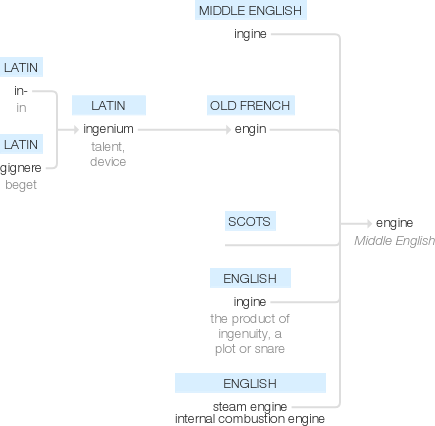Engine
Middle English (formerly also as ingine ): from Old French engin, from Latin ingenium ‘talent, device’, from in- ‘in’ + gignere ‘beget’; compare with ingenious. The original sense was ‘ingenuity, cunning’ (surviving in Scots as ingine ), hence ‘the product of ingenuity, a plot or snare’, also ‘tool, weapon’, later specifically denoting a large mechanical weapon; whence a machine (mid 17th century), used commonly later in combinations such as steam engine, internal combustion engine .
wiktionary
From Middle English engyn, from Anglo-Norman engine, Old French engin(“skill, cleverness, war machine”), from Latin ingenium(“innate or natural quality, nature, genius, a genius, an invention, (in Late Latin) a war-engine, battering-ram”), from ingenitum, past participle of ingignō(“to instil by birth, implant, produce in”). Compare gin, ingenious.
etymonline
engine (n.)
c. 1300, "mechanical device," especially one used in war; "manner of construction," also "skill, craft, innate ability; deceitfulness, trickery," from Old French engin "skill, wit, cleverness," also "trick, deceit, stratagem; war machine" (12c.), from Latin ingenium "innate qualities, ability; inborn character," in Late Latin "a war engine, battering ram" (Tertullian, Isidore of Seville); literally "that which is inborn," from in- "in" (from PIE root *en "in") + gignere, from PIE *gen(e)-yo-, suffixed form of root *gene- "give birth, beget."
Sense of "device that converts energy to mechanical power" is 18c.; in 19c. especially of steam engines. Middle English also had ingeny (n.) "gadget, apparatus, device," directly from Latin ingenium.
